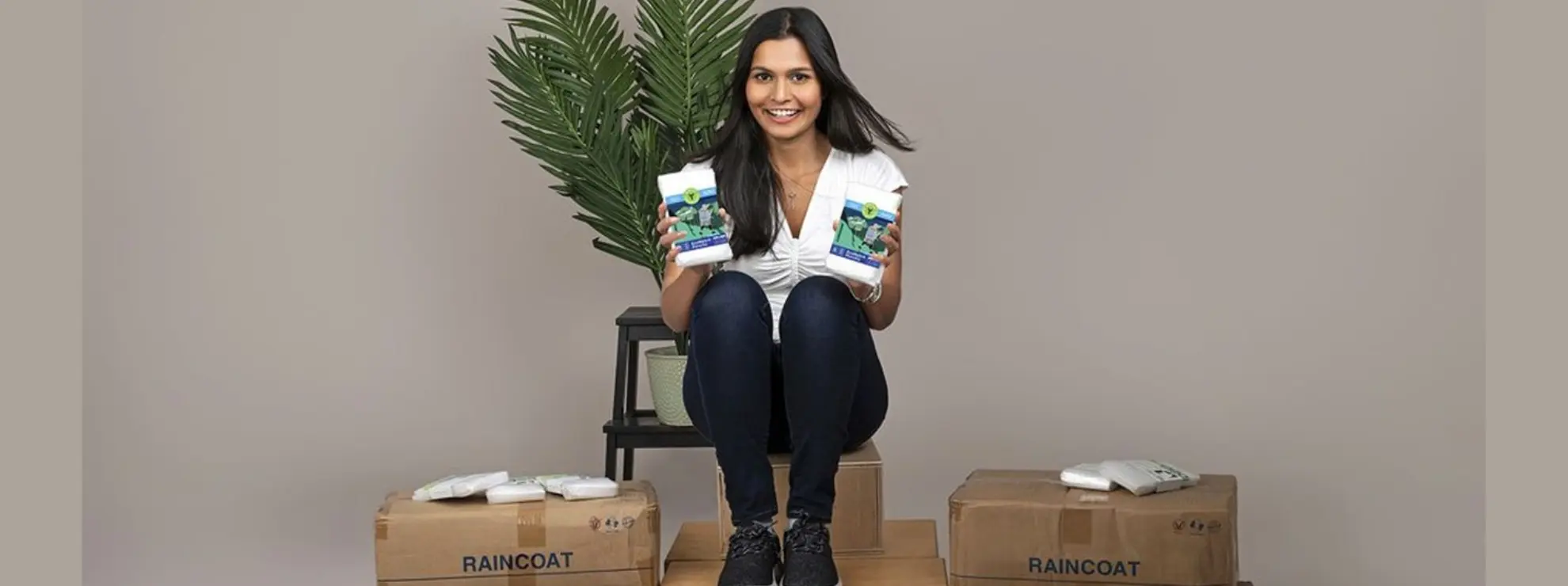(Nov 20, 2024) When Monika Dharia arrived at Duke University to begin her engineering degree, she soon found that classmates, visitors, and faculty were all accustomed to getting around soaking wet, thanks to the sudden thundershowers that were a daily occurrence. Ponchos seemed like the perfect solution to stay dry, Dharia thought, but at the same time, she shuddered at the idea of that much plastic choking her beautiful campus. So, she began looking into compostable ponchos and found they had their own problems, which included a short shelf life—most were not reusable, and there was little information on how to dispose of them. Moreover, ponchos weren’t limited to her college campus; they were used in stadiums, national parks, amusement parks, music festivals, and a host of large-scale events. And a single poncho, she was shocked to learn, was equivalent to 10 plastic bags. This seemingly simple challenge sparked a journey that would lead her to create GreenGear Supply Company—a business at the intersection of environmental engineering, entrepreneurship, and sustainability. The eco-friendly ponchos, made from sugar, catapulted the Global Indian into prominence in the eco-entrepreneurship space.

The Call to Action
Dharia’s background in environmental engineering, combined with her minor in economics, had already primed her to seek actionable solutions to climate challenges. Yet, it wasn’t until her Social Innovation course at Duke that she began to envision a product that would go beyond individual convenience to address systemic environmental issues.
“Every poncho is equivalent to ten plastic bags,” Dharia explained. “And the compostable options on the market? They had their own issues, requiring specialized facilities and short shelf lives. I realized the so-called sustainable solutions weren’t truly sustainable.”
With a clear problem in front of her, Dharia set out to design an alternative. Months of research and prototyping culminated in the EcoRain poncho, made from 100% recyclable bioplastics.
Transforming Vision into Reality
Initially, Dharia planned to distribute her EcoRain ponchos exclusively at Duke, but it didn’t take long for her to recognize a larger market. “I started thinking of all the places where ponchos are used—stadiums, amusement parks, national parks. The environmental impact was staggering,” she said. In 2018, Dharia co-founded GreenGear Supply Company with Russell Heller, a fellow advocate for sustainable business models.
View this post on Instagram
The path wasn’t straightforward. “Early on, I learned that not every piece of advice needs to be followed,” Dharia shared. Participation in the Melissa and Doug Entrepreneurs Program helped her refine her business instincts. “When you’re developing your own idea, you’re your own CEO. Trusting your ambitions and experiences is key.”
Breaking Ground with Innovation
GreenGear’s big break came when it won the Sabin Sustainable Venture Prize at Yale University in 2019. The award not only validated their mission but also provided crucial funding to scale production. By then, Dharia had perfected the design of the EcoRain poncho to ensure it was not only recyclable but also reusable, folding neatly into its hood for convenient storage.
Despite these successes, challenges loomed. Early manufacturing runs revealed issues with non-recyclable components and long production lead times. “Every setback taught us something new about the lifecycle of our products and the responsibility we had to ensure sustainability at every stage,” Dharia said.
A Crisis and a Pivot
When COVID-19 struck, GreenGear faced an existential crisis. With outdoor events canceled and customers scaling back, the demand for ponchos plummeted. But Dharia found an unexpected opportunity to pivot.
“My mom called me one day and said she saw healthcare workers wearing garbage bags as PPE,” Dharia recalled. Leveraging GreenGear’s existing inventory, Dharia launched a GoFundMe campaign, raising enough to donate 5,000 ponchos to healthcare workers in New York and Liberia.
View this post on Instagram
The donations marked a turning point for GreenGear, reinforcing Dharia’s belief in the social impact of her business. “It reminded us why we started this journey in the first place—to solve real-world problems,” she said.
Building Partnerships
Post-pandemic, GreenGear turned its focus back to growth. Monika Dharia secured partnerships with organizations like the Philadelphia Eagles, Duke University, and national parks. The collaboration with the Eagles, a recognized leader in sustainability, was particularly significant.
“The Eagles have been incredible partners,” Dharia said. “We’re now exploring closed-loop recycling programs with them to repurpose ponchos into stadium chairs or roof tiles. It’s a model we hope to expand across the sports industry.”
Beyond sports, GreenGear’s products have also found a place in outdoor tourism and corporate events. “We’re building a network of partnerships that align with our values,” Dharia explained.
Expanding the Vision
Beyond ponchos, GreenGear is diversifying its product line to include other sustainable outdoor items like phone cases, water bottles, and hiking utensils. “We’re not just selling products; we’re rethinking the entire lifecycle of consumer goods,” Dharia emphasized.

To achieve this, Monika Dharia and her team are exploring innovative materials like sugar-based ethanol and natural fibers. “Our goal is to offer alternatives that are not only sustainable but also scalable,” she added.
Lessons in Leadership
For Dharia, the journey has been about more than business. It’s been a lesson in perseverance, adaptability, and leadership. “As businesses, we can’t put the entire burden of sustainability on consumers,” she said. “It’s up to us to design products that are intuitive, impactful, and environmentally responsible.”
Dharia also emphasized the importance of collaboration. “The sustainability challenges we face are too big for any one organization to tackle alone. By working together, we can create solutions that are greater than the sum of their parts,” she said.
Looking Ahead
With her eyes set on scaling GreenGear’s impact, Dharia remains focused on her original mission. Her plans include expanding the company’s market reach and achieving carbon negativity through innovative supply chain practices.

“The future of sustainability lies in shared responsibility,” Dharia said. “It’s not just about what we make—it’s about how we make it and the legacy we leave behind.”
From a rainy day at Duke to a global effort to combat plastic waste, Dharia’s journey is a testament to the power of innovation and the importance of staying true to one’s values. GreenGear is more than a company; it’s a movement, inspiring others to rethink how businesses can drive meaningful change.
Follow Monika Dharia on LinkedIn and check out the GreenGear community on Instagram.




